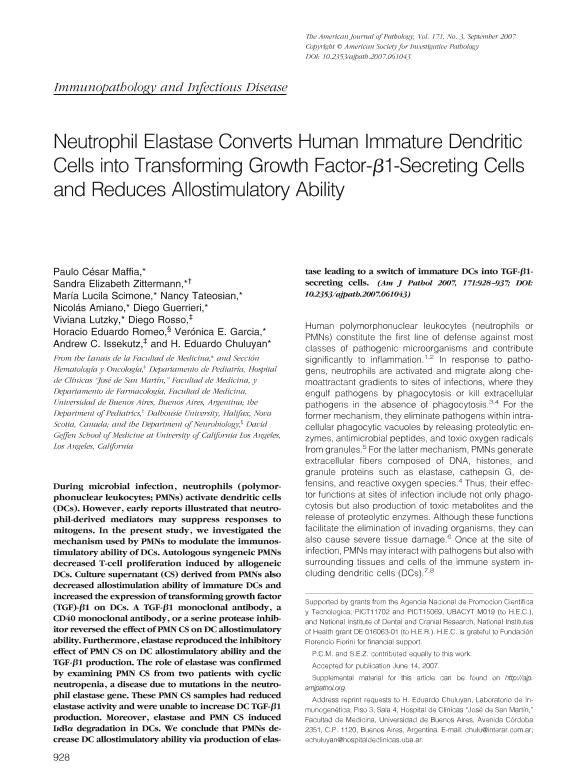Artículo
Neutrophil elastase converts human immature dendritic cells into transforming growth factor-β1-secreting cells and reduces allostimulatory ability
Maffia, Paulo Cesar ; Zittermann, Sandra Elizabeth; Scimone, María Lucila; Tateosian, Nancy Liliana
; Zittermann, Sandra Elizabeth; Scimone, María Lucila; Tateosian, Nancy Liliana ; Amiano, Nicolás Oscar
; Amiano, Nicolás Oscar ; Guerrieri, Diego
; Guerrieri, Diego ; Lutzky, Viviana; Rosso, Diego
; Lutzky, Viviana; Rosso, Diego ; Romeo, Horacio Eduardo
; Romeo, Horacio Eduardo ; García, Verónica Edith
; García, Verónica Edith ; Issekutz, Andrew C.; Chuluyan, Hector Eduardo
; Issekutz, Andrew C.; Chuluyan, Hector Eduardo
 ; Zittermann, Sandra Elizabeth; Scimone, María Lucila; Tateosian, Nancy Liliana
; Zittermann, Sandra Elizabeth; Scimone, María Lucila; Tateosian, Nancy Liliana ; Amiano, Nicolás Oscar
; Amiano, Nicolás Oscar ; Guerrieri, Diego
; Guerrieri, Diego ; Lutzky, Viviana; Rosso, Diego
; Lutzky, Viviana; Rosso, Diego ; Romeo, Horacio Eduardo
; Romeo, Horacio Eduardo ; García, Verónica Edith
; García, Verónica Edith ; Issekutz, Andrew C.; Chuluyan, Hector Eduardo
; Issekutz, Andrew C.; Chuluyan, Hector Eduardo
Fecha de publicación:
12/2007
Editorial:
American Society of Investigative Pathology
Revista:
American Journal Of Pathology
ISSN:
0002-9440
Idioma:
Inglés
Tipo de recurso:
Artículo publicado
Clasificación temática:
Resumen
During microbial infection, neutrophils (polymorphonuclear leukocytes; PMNs) activate dendritic cells (DCs). However, early reports illustrated that neutrophil-derived mediators may suppress responses to mitogens. In the present study, we investigated the mechanism used by PMNs to modulate the immunostimulatory ability of DCs. Autologous syngeneic PMNs decreased T-cell proliferation induced by allogeneic DCs. Culture supernatant (CS) derived from PMNs also decreased allostimulation ability of immature DCs and increased the expression of transforming growth factor (TGF)-β1 on DCs. A TGF-β1 monoclonal antibody, a CD40 monoclonal antibody, or a serine protease inhibitor reversed the effect of PMN CS on DC allostimulatory ability. Furthermore, elastase reproduced the inhibitory effect of PMN CS on DC allostimulatory ability and the TGF-β1 production. The role of elastase was confirmed by examining PMN CS from two patients with cyclic neutropenia, a disease due to mutations in the neutrophil elastase gene. These PMN CS samples had reduced elastase activity and were unable to increase DC TGF-β1 production. Moreover, elastase and PMN CS induced IκBα; degradation in DCs. We conclude that PMNs decrease DC allostimulatory ability via production of elastase leading to a switch of immature DCs into TGF-β1-secreting cells.
Palabras clave:
DENDRITIC CELLS
,
TTGF
Archivos asociados
Licencia
Identificadores
Colecciones
Articulos(IQUIBICEN)
Articulos de INSTITUTO DE QUIMICA BIOLOGICA DE LA FACULTAD DE CS. EXACTAS Y NATURALES
Articulos de INSTITUTO DE QUIMICA BIOLOGICA DE LA FACULTAD DE CS. EXACTAS Y NATURALES
Citación
Maffia, Paulo Cesar; Zittermann, Sandra Elizabeth; Scimone, María Lucila; Tateosian, Nancy Liliana; Amiano, Nicolás Oscar; et al.; Neutrophil elastase converts human immature dendritic cells into transforming growth factor-β1-secreting cells and reduces allostimulatory ability; American Society of Investigative Pathology; American Journal Of Pathology; 171; 3; 12-2007; 928-937
Compartir
Altmétricas



